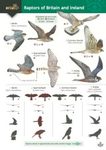By
Leon (NHBS Catalogue Editor)
24 Aug 2020
Written for Hardback

Some encounters change the course of your life. For young American Peace Corps volunteer Jonathan C. Slaght, it was a chance sighting of a rare owl in the Russian Far East that turned him onto the path of wildlife conservation. Hidden behind the conservation plans and the data there are amazing personal stories that are not often told.
Owls of the Eastern Ice is a spellbinding memoir of determination and obsession with safeguarding the future of this bird of prey that firmly hooked its talons in me and did not let go.
Primorye, or Primorsky Krai, is a remote spit of land in the Russian Far East, wedged between China and the Sea of Japan, that is as bleak and forbidding as the cover of the book suggests. It is home to bears, tigers, leopards, and the elusive Blakiston’s fish owl that went unnoticed by local ornithologists for a century. But the area is not free of human pressures. The locals have a long tradition of living off the land, hunting and fishing, while commercial industries such as mining and logging are being developed. But not to the point that it has severely degraded this ecosystem. Yet. Successful wildlife conservation here requires cooperation with local interests, which requires knowledge.
Owls of the Eastern Ice thus tells the story of Slaght’s PhD project from 2006 to 2010 to collect baseline data on these long-lived owls: where they nest, what landscape features they prefer, or how large their territories are.
What sounds like a simple plan on paper – find some owls, fit them with radio transmitters, monitor where they go – hides weeks or months of back-breaking labour on a shoestring budget, endless patience, and sometimes the bitter disappointment of having nothing to show for it. Especially in remote parts of the world, even the most mundane tasks can be challenging beyond the comprehension of most Westerners (I had my brush with this as a student). So, in some ways,
Owls of the Eastern Ice is the classical hero’s journey, Slaght starting out as a rookie who is not even quite sure what these birds look or sound like. During the successive three-month field seasons, he goes from fleeting glimpses of fleeing owls to catching, banding, and tagging a handful of adults, to ultimately observing intimate moments in the lives of these birds. For interested readers, endnotes will lead you to the hard biological facts published in papers and books. Here, it is his vivid descriptions that bring this mysterious raptor to live: “Breathy, low and organic, the fish owls’ call pulsed through the forest, hiding among the creaking trees and bending with the rushing river. It was the sound of something ancient and in its place.”
A lot of what propels this book, however, is the human story. Even though Slaght has visited Primorye for years before starting this project and speaks Russian, his novice mistakes and the steep learning curve of the fieldwork make it clear that he remains an outsider. I might have called this a hero’s journey, but Slaght never pretends to be one: this is a team effort. Next to his mentor Sergey Surmach there is a motley crew of assistants and fixers with their own idiosyncrasies who share cramped sleeping quarters and all-night stakeouts; from a cynical former coal miner to a virtuoso snorer with a urine fetish. The help of locals with their own colourful backstories – hermits, hunters, and loggers – is equally crucial to making this research possible.
Slaght’s observations of the cultural differences and the occasional misunderstandings flowing from them provide plenty of amusing anecdotes: the stubborn, manly-man Russian attitudes that not infrequently get people into trouble, the unusual Eastern European superstitions, and the local customs that often involve long drinking sessions. (Why sell bottles of vodka with a cap? “Either a bottle is full or it is empty, with only a short period between these two states.”) But Slaght never descends into mockery or disrespectful cultural voyeurism, and recognizes how crazy his calling is. The people he meets regularly wonder who in his right mind would spend the winter months in this remote corner of the world chasing after some birds.
In many ways, the starring role is reserved for nature itself: the majestic forest taiga and the cold spine of the Sikhote-Alin mountain chain against. No mere backdrop, it rules man and beast alike, readily taking the lives of those unwary, unprepared, or just plain unlucky. Fieldwork here is a constant struggle against the elements, dictated by the changing of the seasons. The violence of the spring melt gives rise to phenomena that have no words outside of the Russian language.
Slaght takes all these elements – the owls like a fever-dream out of a Jim Henson movie, the hardy cast of locals, and nature’s raw power – and weaves them into a memoir so mesmerizing and spellbinding that I was compelled to read this book in a single sitting. I have tried not to reveal too many details in this review so as not to spoil potential readers. I will just say that if you enjoy wilderness travelogues or books such as Schaller’s
Tibet Wild or Berger’s recent book
Extreme Conservation, then you will devour
Owls of the Eastern Ice. The fish owls are blessed to have someone like Slaght fight their cause. And if my review did not convince you, have a look at the above book trailer.





































